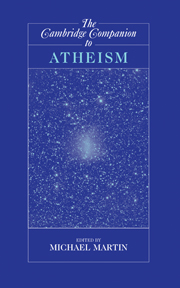Book contents
- Frontmatter
- General Introduction
- Part I Background
- Part II The Case against Theism
- 4 Theistic Critiques of Atheism
- 5 The Failure of Classical Theistic Arguments
- 6 Some Contemporary Theistic Arguments
- 7 Naturalism and Physicalism
- 8 Atheism and Evolution
- 9 The Autonomy of Ethics
- 10 The Argument from Evil
- 11 Kalam Cosmological Arguments for Atheism
- 12 Impossibility Arguments
- Part III Implications
- Index
- Series List
6 - Some Contemporary Theistic Arguments
from Part II - The Case against Theism
Published online by Cambridge University Press: 28 January 2007
- Frontmatter
- General Introduction
- Part I Background
- Part II The Case against Theism
- 4 Theistic Critiques of Atheism
- 5 The Failure of Classical Theistic Arguments
- 6 Some Contemporary Theistic Arguments
- 7 Naturalism and Physicalism
- 8 Atheism and Evolution
- 9 The Autonomy of Ethics
- 10 The Argument from Evil
- 11 Kalam Cosmological Arguments for Atheism
- 12 Impossibility Arguments
- Part III Implications
- Index
- Series List
Summary
In this chapter, I examine some contemporary theistic arguments. By “theistic argument ” I mean an argument for the truth of theism or the reasonableness of theistic belief. Obviously, this is a broad and unavoidably vague definition. Theistic arguments differ widely in what they claim, in the strength of the claim, in the kinds of premises they adduce, in the logical structure of the argument (whether deductive, inductive, or abductive), and in innumerable other details. Theistic philosophers differ widely in their epistemological, metaphysical, and theological convictions. Clearly, even the attempt to sketch a taxonomy of theistic arguments would require more space than I have here. The selection of the arguments examined here is therefore severely limited and unavoidably somewhat idiosyncratic, reflecting my own perception of the strengths, weaknesses, and significance of the arguments presently offered in defense of theism. A cursory glance at many arguments would be pointless, so I shall consider just a few. Fortunately, other chapters in this volume fill in the many lacunae inevitably left by the need to be so severely selective.
Inmy1989 book God and the Burden of Proof, I chose Alvin Plantinga and Richard Swinburne as the two outstanding representatives of contemporary theistic philosophy. I see no reason to alter that judgment today, despite the noteworthy contributions of many other prominent theistic philosophers. Plantinga and Swinburne, in their polished, trenchant, voluminous, and very influential writings, have set the bar high. Also, they present an interesting and very distinct contrast in their approaches to the defense of theism. Swinburne takes a more traditional approach. His inductive versions of traditional arguments are a development of classical natural theology. Plantinga, coming from a very different epistemological and theological perspective, argues that theistic belief is rational because it is properly basic. This chapter therefore focuses on some of the key theistic arguments of Plantinga and Swinburne.
- Type
- Chapter
- Information
- The Cambridge Companion to Atheism , pp. 102 - 117Publisher: Cambridge University PressPrint publication year: 2006

